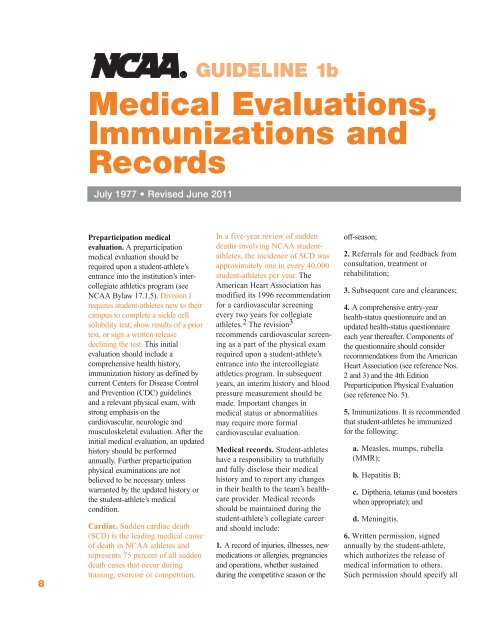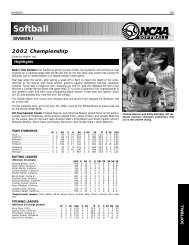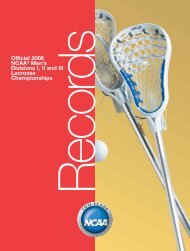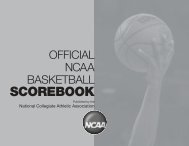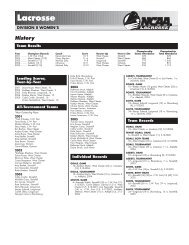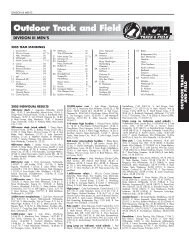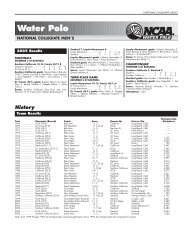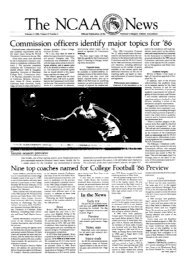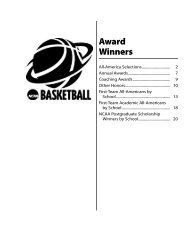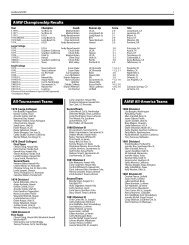Sports Medicine Handbook - NCAA
Sports Medicine Handbook - NCAA
Sports Medicine Handbook - NCAA
Create successful ePaper yourself
Turn your PDF publications into a flip-book with our unique Google optimized e-Paper software.
8<br />
Medical Evaluations,<br />
Immunizations and<br />
Records<br />
July 1977 • Revised June 2011<br />
Preparticipation medical<br />
evaluation. A preparticipation<br />
medical evaluation should be<br />
required upon a student-athlete’s<br />
entrance into the institution’s intercollegiate<br />
athletics program (see<br />
<strong>NCAA</strong> Bylaw 17.1.5). Division I<br />
requires student-athletes new to their<br />
campus to complete a sickle cell<br />
solubility test, show results of a prior<br />
test, or sign a written release<br />
declining the test. This initial<br />
evaluation should in clude a<br />
comprehensive health his tory,<br />
immunization history as de fined by<br />
current Centers for Di sease Control<br />
and Prevention (CDC) guidelines<br />
and a relevant physical exam, with<br />
strong emphasis on the<br />
cardiovascular, neurologic and<br />
musculoskeletal evaluation. After the<br />
initial medical evaluation, an updated<br />
his tory should be performed<br />
an nually. Further prepar ticipation<br />
physical examinations are not<br />
believed to be necessary unless<br />
warranted by the updated history or<br />
the student-athlete’s medical<br />
condition.<br />
Cardiac. Sudden cardiac death<br />
(SCD) is the leading medical cause<br />
of death in <strong>NCAA</strong> athletes and<br />
represents 75 percent of all sudden<br />
death cases that occur during<br />
training, exercise or competition.<br />
GUIDELINE 1b<br />
In a five-year review of sudden<br />
deaths involving <strong>NCAA</strong> studentathletes,<br />
the incidence of SCD was<br />
approximately one in every 40,000<br />
student-athletes per year. The<br />
American Heart Association has<br />
modified its 1996 recommendation<br />
for a cardiovascular screening<br />
every two years for collegiate<br />
athletes. 2 The revision 3<br />
recommends cardiovascular screening<br />
as a part of the physical exam<br />
required upon a student-athlete’s<br />
entrance into the intercollegiate<br />
athletics program. In subsequent<br />
years, an interim history and blood<br />
pressure measurement should be<br />
made. Important changes in<br />
medical status or abnormalities<br />
may require more formal<br />
cardiovascular evaluation.<br />
Medical records. Student-athletes<br />
have a responsibility to truthfully<br />
and fully disclose their medical<br />
history and to report any changes<br />
in their health to the team’s healthcare<br />
provider. Medi cal records<br />
should be maintained during the<br />
student-athlete’s collegiate career<br />
and should include:<br />
1. A record of injuries, illnesses, new<br />
medications or allergies, pregnancies<br />
and operations, wheth er sustained<br />
during the com petitive season or the<br />
off-season;<br />
2. Referrals for and feedback from<br />
consultation, treatment or<br />
rehabilitation;<br />
3. Subsequent care and clearances;<br />
4. A comprehensive entry-year<br />
health-status questionnaire and an<br />
updated health-status questionnaire<br />
each year thereafter. Components of<br />
the questionnaire should consider<br />
recommendations from the American<br />
Heart Association (see reference Nos.<br />
2 and 3) and the 4th Edition<br />
Preparticipation Physical Evaluation<br />
(see reference No. 5).<br />
5. Immunizations. It is recommended<br />
that student-athletes be immunized<br />
for the following:<br />
a. Measles, mumps, rubella<br />
(MMR);<br />
b. Hepatitis B;<br />
c. Diptheria, tetanus (and boosters<br />
when appropriate); and<br />
d. Meningitis.<br />
6. Written permission, signed<br />
annually by the student-athlete,<br />
which authorizes the release of<br />
medical information to others.<br />
Such permission should specify all


